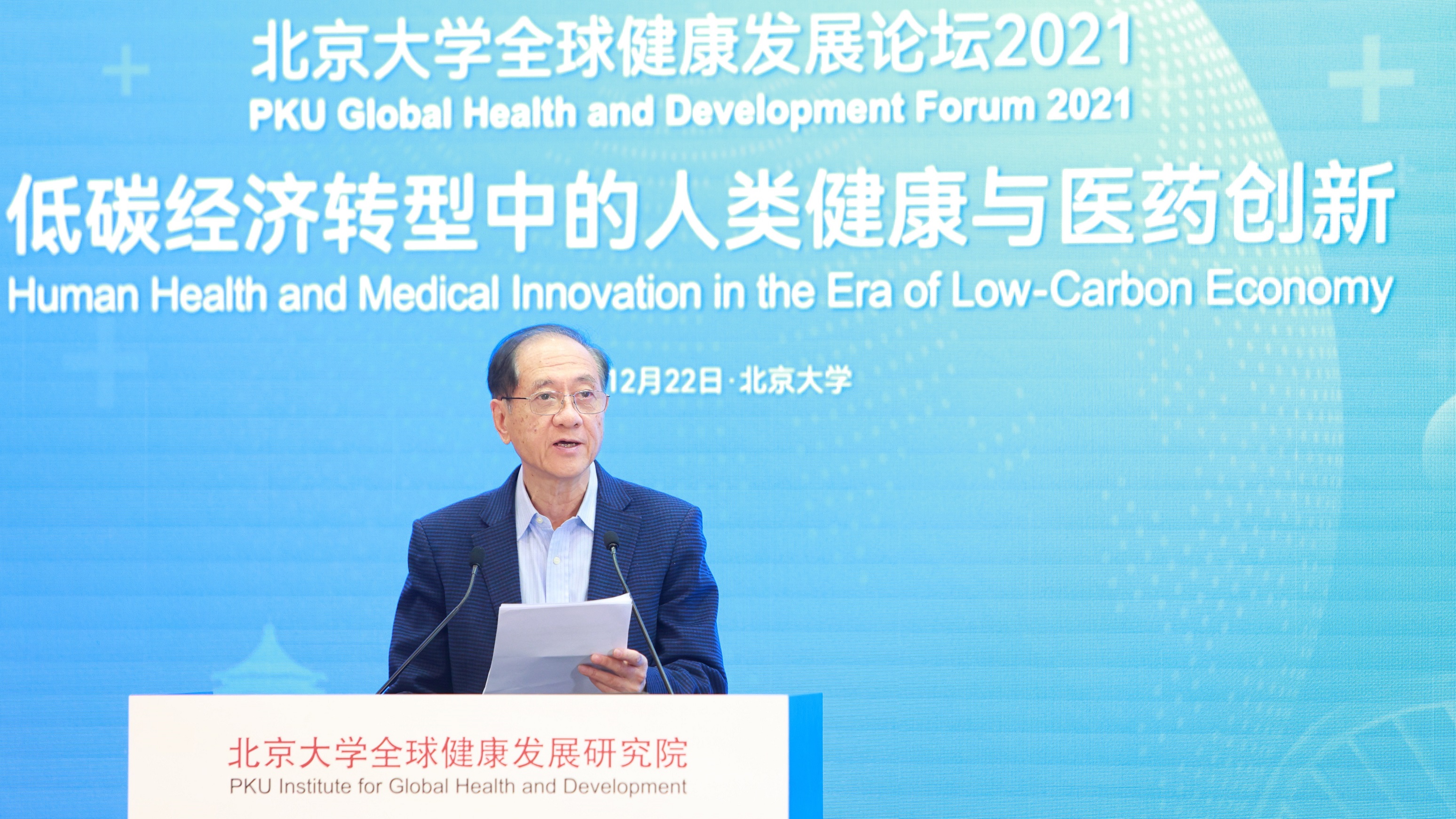
On December 22, 2021, on the first anniversary of the establishment of the Peking University Institute for Global Health and Development (PKU-iGHD), the “2021 Peking University Global Health and Development Forum: Human Health and Medical Innovation in the Era of Low Carbon Economy” was held at Zhongguanyuan Global Village, Peking University. Han Qide, Chairman of the Advisory Council of PKU-iGHD delivered a speech at the Opening.
Distinguished guests, Ladies and gentlemen,
Good morning, good afternoon, and good evening! Welcome all of you to today's Forum no matter where you are! I am glad to see old and new friends here as well as many participants online.
The theme of this year's forum is“Human Health and Medical Innovation in the Era of Low-Carbon Economy". First of all, let me start by congratulating the Forum organizers, led by my colleague Prof. Gordon Liu, for choosing this great topic timely to address online and offline together today through the Forum here at Peking University.
As we speak, the human world is still fighting against the new wave of the pandemic. But in the meantime, we are also facing many other challenges, some of which are much tougher to deal with in the long run, including major non- communicable diseases and climate change. Fortunately, or not, many of the leading disease conditions and environmental issues are closely interacted, offering us great opportunities to search for more cost-effective solutions when conducting strategic actions holistically. For example, when assessing the costs and benefits of switching a fossil-fuel power station to a solar PV power plant, the action equation may be solved with very different optimal choices with or without including the health gains. Likewise, investing in a healthy city project may be more worthwhile with a much cleaner landscape when considering its contributions to the goal of low carbon transition.
In particular, we actually know quite a lot from the literature on how human health can be influenced substantially by global warming and air pollution in particular. For example, based on a recent study by Harvard scientists and collaborators in 2021, as high as 8 million people died in 2018 from fossil fuel pollution, which was responsible for about 1 in 5 deaths worldwide. Numerous studies also suggest that human health is very much impacted by climate change through channels such as extreme temperature, leading to a huge burden of illness worldwide. Meanwhile, plenty of studies have shown that turning into a low-carbon economy would generate tremendous health co-benefits by reducing fossil fuel use and relying more on cleaner production. Therefore, in this regard, rich research evidence is available to support a broad consensus on how important and worth while it is to pursue actions for low-carbontransitions. But the real question remains as“how”to do it, calling for increased efforts for technological innovation and political commitments, both domestically and globally.
From the health perspective, however, research evidence is relatively scant regarding how health reform and system development can contribute to low- carbon transitions. Interestingly, some insights and encouraging messages may be obtained from recent changes in China's health policy settings. For brain storming, let me share a few observations. As you may be aware, in 2016, when launching the 13th five-year plan, the“Healthy China 2030 Blueprint”was initiated as a top national development strategy. Following the Blue print, a well-scheduled roadmap of Healthy China Action Plans has been made, including the national promotion of Health Knowledge, Healthy Diet, Healthy Exercise, and Smoking Control. Presumably, if all these goals are achieved as scheduled in time, the low-carbon contributions would be noticeable but not quantified yet because all these action plans would be essentially associated with decarbonization in nature.
Another important aspect is the healthcare system reform that may help reduce a great deal of carbon emissions on its way forward. Following the Reform policy settings, two areas are particularly important with great potential for emission reductions, one of which is pharmaceutical policy reform, involving changes in R&D, manufacturing, distribution, prescribing, and appropriate utilization. For illustration, based on some research, the pharmaceutical industry alone is even more emission-intensive than the automotive industry. Public hospital reform is another major reform component. As indicated in a 2019 paper in Lancet Planetary Health, public hospitals are responsible for over 48% of total emissions by the Chinese healthcare system, offering great opportunities for emission reduction if considered as anadditional goal in the hospital reform efforts.
Because of time limitation, I can only highlight some of those crude observations above, hoping to trigger more thoughtful responses, insights, and perhaps some sound policy advices by the following distinguished speakers, and the audience at large.
Once again, I think this Forum picks a very right topic to address at the right time and in the right place here at the Peking University, where we remain strongly committed to improving global health and human development through scientific inquiry and knowledge sharing worldwide. In closing, I wish the Forum a great success and all of you a pleasant and productive day.
Thank you all!